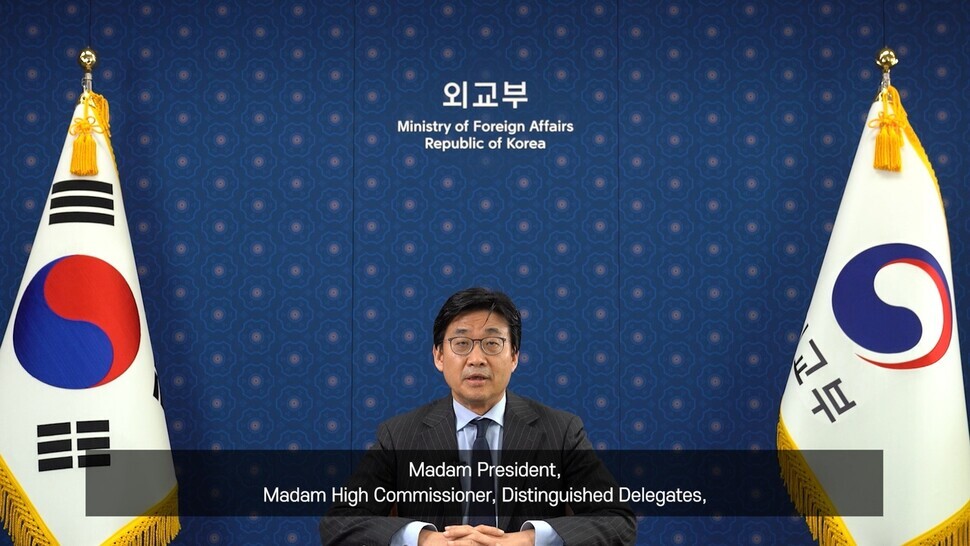hankyoreh
Links to other country sites 다른 나라 사이트 링크
Japan finds S. Korean diplomat’s comfort women remark “unacceptable”

The Japanese government has taken issue with a South Korean government spokesperson’s remark that the comfort women issue is a “universal human rights issue” that people should work together to resolve. Tokyo described the remark as “unacceptable,” citing a comfort women agreement concluded with Seoul in December 2015.
“Japan cannot accept this kind of remark in light of the comfort women agreement that we reached with South Korea [in December 2015], which confirmed that the comfort women issue has been finally and irreversibly resolved,” Japanese Chief Cabinet Secretary Katsunobu Kato said during a daily press briefing on the morning of Feb. 24.
Kato was referring to remarks made by South Korea’s Second Vice Foreign Minister Choi Jong-moon during a keynote address at the 46th session of the UN Human Rights Council, which was held in Geneva, Switzerland, on Feb. 23.
Kato said that Kazuyuki Yamazaki, Japan’s ambassador to international organizations in Geneva, had conveyed these thoughts to his South Korean counterpart and that he would express Japan’s position when the council opens up the floor for responses.
In earlier remarks, Choi mentioned sexual violence in regions of conflict as an “urgent” human rights concern that humankind needed to work together to combat.
“The current and future generations need to learn an invaluable lesson from the painful experience of the so-called ‘comfort women’ victims during the Second World War,” he stressed, adding that the “comfort women tragedy needs to be approached as a universal human rights issue.”
Choi went on to discuss South Korea’s efforts to heal the trauma suffered by the comfort women survivors but did not explicitly mention or denounce Japan.
While the South Korean and Japanese governments agreed to “refrain from condemning or criticizing one another on this issue before the UN or international community” in their comfort women agreement on Dec. 28, 2015, the two sides have never agreed to not broach the topic at all.
But with Kato insisting that Japan would “assert [its] right to respond and argue [its] position,” a heated war of words appears likely to unfold before the UN Human Rights Council between the South Korean and Japanese representatives.
By Gil Yun-hyung, staff reporter
Please direct comments or questions to [english@hani.co.kr]

Editorial・opinion
![[Column] Season 2 of special prosecutor probe may be coming to Korea soon [Column] Season 2 of special prosecutor probe may be coming to Korea soon](https://flexible.img.hani.co.kr/flexible/normal/500/300/imgdb/original/2024/0426/3317141030699447.jpg) [Column] Season 2 of special prosecutor probe may be coming to Korea soon
[Column] Season 2 of special prosecutor probe may be coming to Korea soon![[Column] Park Geun-hye déjà vu in Yoon Suk-yeol [Column] Park Geun-hye déjà vu in Yoon Suk-yeol](https://flexible.img.hani.co.kr/flexible/normal/500/300/imgdb/original/2024/0424/651713945113788.jpg) [Column] Park Geun-hye déjà vu in Yoon Suk-yeol
[Column] Park Geun-hye déjà vu in Yoon Suk-yeol- [Editorial] New weight of N. Korea’s nuclear threats makes dialogue all the more urgent
- [Guest essay] The real reason Korea’s new right wants to dub Rhee a founding father
- [Column] ‘Choson’: Is it time we start referring to N. Korea in its own terms?
- [Editorial] Japan’s rewriting of history with Korea has gone too far
- [Column] The president’s questionable capacity for dialogue
- [Column] Are chaebol firms just pizza pies for families to divvy up as they please?
- [Column] Has Korea, too, crossed the Rubicon on China?
- [Correspondent’s column] In Japan’s alliance with US, echoes of its past alliances with UK
Most viewed articles
- 1[Column] Season 2 of special prosecutor probe may be coming to Korea soon
- 2No good, very bad game for Korea puts it out of Olympics for first time since 1988
- 3‘We must say no’: Seoul defense chief on Korean, USFK involvement in hypothetical Taiwan crisis
- 4Division commander ordered troops to enter raging flood waters before Marine died, survivor says
- 5Is Japan about to snatch control of Line messenger from Korea’s Naver?
- 6Korea’s 1.3% growth in Q1 signals ‘textbook’ return to growth, says government
- 7Is N. Korea threatening to test nukes in response to possible new US-led sanctions body?
- 8[Editorial] Korea’s surprise Q1 growth requires objective assessment, not blind fanfare
- 9[Editorial] New weight of N. Korea’s nuclear threats makes dialogue all the more urgent
- 10[Editorial] In the year since the Sewol, our national community has drowned